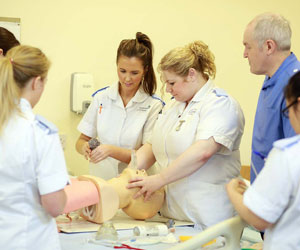New courses awaiting approval are shown as 'subject to validation' as some fuller detail of the course may not yet be available. As soon as the new award is validated, full details are provided through the detailed Programme Specification being made available through the course webpages. In the very unlikely event of a new course not being approved, applicants would be contacted and the University would work with them to identify alternative options within the University, or elsewhere.
Courses going through periodic review could change slightly but overall aims are unchanged and there would only be minor updates to content and/or structure. As such, the existing Programme Specification provides a reasonable reflection of the course and an updated version will be made available through the course webpages after each periodic review event. Occasionally courses go through a more substantial review process called revalidation, meaning that the course (aims and content) are likely to change significantly. In such cases the fuller detail of the revised course may not be available but as soon as the programme is revalidated, the new Programme Specification will be made available through the course webpages.
If you have a background in psychology, sociology or criminology, this postgraduate certificate course is ideal for gaining deeper insight into topics pertinent to interpersonal violence and abuse. We look at the impact of abuse in different international, cultural and social contexts, and you'll have the chance to examine practice from research and theoretical perspectives.
Graduate destinations
The skills and knowledge gained on this course will enhance employability in a wide range of jobs; safeguarding is an essential part of practice across education, occupational, health, social work, and forensic settings. Students who complete this certificate may go on to complete a full MSc Psychology with us, either in Interpersonal Violence and Abuse, or in Applied Social science.
Course outline
Course summary
We offer a stimulating and challenging environment where you can build on your existing learning experiences to advance your academic and professional development. You will gain specialised knowledge and a critical awareness of issues at the forefront of interpersonal violence and abuse. Teaching is done through a variety of blended learning and campus-based activities explicitly designed to meet the needs of learners working in a range of contexts.
Modules
Year 1
- HLLP7010 Professional values and ethics
- HLLP7044 Psychology of violent behaviour
- HLLP7041 Interpersonal violence and abuse
Programme Specification
Programme specification (PDF)
Assessment, Feedback, and Teaching and Learning methods
Full details are available in the programme specification.
Timetables
The teaching timetable should be available from the end of August. Access to the timetable is through the Student Hub – you will be able to access the Student Hub after you have completed online registration. The teaching day is 9am to 6pm, Monday to Friday; please keep your other commitments open until confirmation of your teaching timetable, and bear in mind that many courses will offer placements or fieldwork which sometimes extends into the evenings and weekends.
Entry requirements
Have a question about our entry requirements?
Entry Requirements
1st or 2nd class honours degree.
Students with other qualifications may be admitted to the course, please contact the Enquiry Centre for further details.
Accreditation of Prior Learning (APL) may be considered for relevant prior learning at the same academic level.
More information about levels and credits.
Selection criteria
We offer a stimulating and challenging environment where you can build on your existing learning experiences to advance your academic and professional development. You will gain specialised knowledge and a critical awareness of issues at the forefront of interpersonal violence and abuse. Teaching is done through a variety of blended learning and campus-based activities explicitly designed to meet the needs of learners working in a range of contexts.
Application information
See programme specification
Student finance
We have a wide range of scholarships, bursaries, grants and funds available to support you throughout your studies with us. This includes the Cumbria Bursary - a non-repayable bursary designed to support first year students with a household income of less than £25,000..
Student Finance Tuition Fee PolicyResources and facilities
Our teaching staff are active researchers and expert academics in their field, using great facilities to enhance your learning. We also work closely with a number of external organisations, including HMP Haverigg, Circles of Support and Carlisle Key






